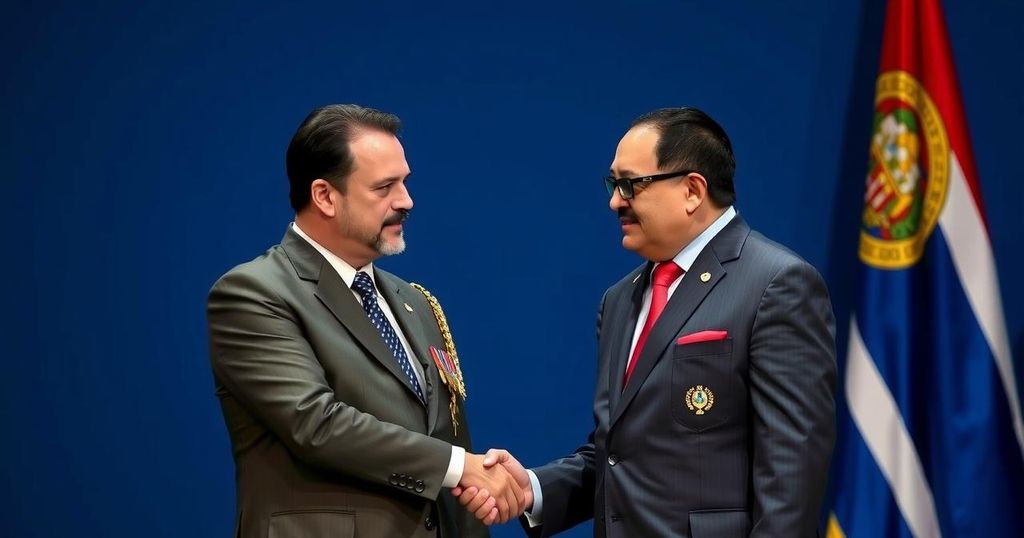Costa Rica Honors President Bukele for Combatting Gang Violence in El Salvador

Costa Rica has honored El Salvador President Nayib Bukele for successfully reducing violence from street gangs in a controversial campaign. Despite the high homicide rates in Costa Rica, President Chaves praised Bukele’s methods while acknowledging the challenges in his own governance. Bukele argues that the right to life must be prioritized in addressing violence, as issues of democracy and civil rights intersect with security measures.
Costa Rica recently awarded its highest diplomatic honor to El Salvador President Nayib Bukele, recognizing his achievements in reducing violence during his extensive campaign against powerful street gangs. During a ceremony held in San Jose, President Rodrigo Chaves praised Bukele’s ability to combat crime despite Costa Rica’s current struggles with elevated homicide rates. However, the honor has sparked controversy in Costa Rica, a nation long regarded as Central America’s most stable democracy. The effectiveness of Bukele’s strategies has raised concerns, particularly regarding the suspension of constitutional rights that allows security forces greater authority in detaining suspects. Despite this, Bukele secured a historic second term earlier this year, reflecting his sustained popularity among voters. In contrast, President Chaves lacks a legislative majority and is still establishing his political footing. He has emphasized the necessity of addressing the region’s crime problems, aligning his sentiments with those of Bukele. Chaves, highlighting the regional implications of El Salvador’s security progress, remarked, “El Salvador’s rescue from those nefarious claws is also helping the peace in our region.” He underscored the importance of reducing gang influence across Central America. As Costa Rica experiences a rise in violent crime, partly due to drug trafficking, Chaves acknowledged last year’s record homicide rate and the urgent need for effective crime-fighting measures. In addressing criticism of his administration, Bukele emphasized that the right to life must precede civil liberties, stating, “All the other rights aren’t worth it if there’s no right to life. There can’t be a right to (free) movement if I’m dead.” His comments reflect the complex balance between security and individual rights, a debate that is increasingly relevant in both El Salvador and Costa Rica.
The article discusses Costa Rica’s recent recognition of El Salvador President Nayib Bukele by awarding him the National Order of Juan Mora Fernández. This honor reflects Bukele’s success in combating violence related to gang activity in El Salvador, where he has implemented controversial measures that curtail constitutional rights. As Costa Rica grapples with rising violence and homicide rates, the political dynamics between President Bukele and President Chaves illustrate the challenges of governance in a region struggling with security issues and democratic values.
In conclusion, Costa Rica’s awarding of its highest diplomatic honor to President Nayib Bukele highlights his significant, albeit controversial, successes in reducing violence in El Salvador. While Bukele’s measures have resulted in notable security gains, the implications for civil liberties and democratic processes remain contentious. President Chaves’ remarks draw attention to the broader implications of crime-fighting efforts in Central America, as both leaders navigate their respective political landscapes in addressing rampant violence.
Original Source: abcnews.go.com







